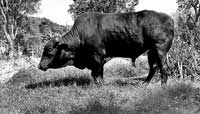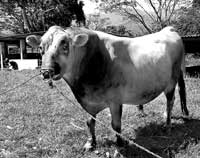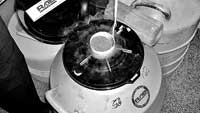
Artificial implants to boost milk outputWith milk food prices increasing in the world market, the artificial insemination centre at Kundasale is likely to gain more importance as the Government plans to increase local milk production in the country. Mr.W W Abeygunawardene who is in charge of the centre told Kandy Times that European and Indian animals which are well-known for being able to produce a large quantity of milk are used for breeding purposes.
“We store the semen obtained from these animals in deep freezers and dispatch the semen to areas including those in the north and east, where dairy farming is actively pursued,” he said. Mr. Abeygunewardene said that under a proposed 10 year plan the centre hopes to increase milk production. The centre is responsible for the distribution of impregnated seed islandwide with even nitrogen containers to store the semen being supplied by the centre. The impregnation process is carried out by distributors islandwide under the guidance of the various veterinary officers. Whereas a local cow’s milk yield after litter is only about 9 litres in three months, an impregnated cow’s yield is much more.
The process is an ongoing one in the Nuwara Eliya district but not so in the North Central Province and Northern Province, although the cow population is high in these areas. If better results are expected the stray cattle must be made use of which is a matter that should receive the attention of the Provincial Councils concerned, Mr. Abeygunewardene said. It is estimated that as much as 150,000 impregnations take place at present and cows in the Kandy and Nuwara Eliya districts are fatter than those in other areas. The same process must be carried out in the dry zone if the milk industry is to improve. The Kundasale centre is short of both workers and officials. If the impregnation process is successful the island’s milk requirements could be met, is the opinion of Mr. Abeygunawardene. Of the 1.6 million cow population in Sri Lanka, only half yield milk. |
||||||
|| Front
Page | News | Editorial | Columns | Sports | Plus | Financial
Times | International | Mirror | TV
Times | Funday
Times | Kandy
Times || |
| |
Reproduction of articles permitted when used without any alterations to contents and the source. |
© Copyright
2007 | Wijeya
Newspapers Ltd.Colombo. Sri Lanka. All Rights Reserved. |


